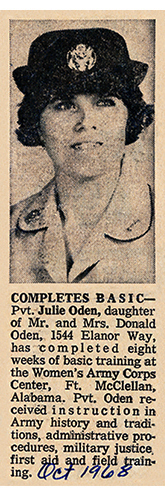 Julie Kirk began her life in 1949 in Bangor, Maine. At age five, her parents and her four siblings moved to California.
Julie Kirk began her life in 1949 in Bangor, Maine. At age five, her parents and her four siblings moved to California.
She lived through violent family times as her alcoholic father frequently beat her mother and older brother. At age eight, his severe beatings required her grandmother to rescue them and take them to her home in Lone Pine, California, where the three girls lived together for a year. Julie escaped her father’s wrath but soon fell victim to her grandfather who began to molest her. When her family found out four years later, her grandfather went to prison for it but her family blamed her as the guilty party.
Though Julie loved her mother dearly, they endured a turbulent relationship exacerbated by her mother’s admission that she was not a wanted child.
When she was ten her mother remarried a man whom Julie acknowledged was very good to her family, evidenced by his adoption of her and her two sisters.
Because Julie continued to struggle with her mother, lacked confidence and did poorly in school, she felt the need to leave home after high school and yearned to join the military.
In the Army, Julie trained as a medic and worked on the surgical floor at the hospital at Ft. Leonard Wood, Missouri, treating men injured in Vietnam. After several months, she left the Army with an honorable under medical conditions discharge due to a mental breakdown caused by a sexual assault, which she did not report or disclose.
That incident severely affected her life for decades until she started a counseling program at the VA. She then learned about Operation Freedom Paws where she was partnered with her service dog, Mal. Julie declares, “He is everything to me.”
EXCERPTS FROM OUR CONVERSATION
Vicki Topaz: When did you enlist?
Julie Kirk: When I was 18, I tested for the Navy. I passed and everything, but they had me on a three-month waiting list. I didn’t want to wait so I went to the Army recruiting office, passed their test and went in to be trained as a medic.
Where did you go for basic training?
I went to Ft. McClellan in Alabama.
When you enlisted, did you think you would go to Vietnam?
No, because at that time they were not allowing women medics there, only RNs, LVNs and male medics. I never went to Vietnam. But I took care of men that came back from Vietnam.
How would you describe basic training?
I loved it. In fact, I can tell you a funny story. We were always taught that no matter what, you listen to your sergeant. You never listen to anybody else. We went out on a night bivouac and had to hunker down because they were shooting shells around us. We had to tap somebody’s helmet and then get up and go. They tapped me, I turned around to tap somebody else and the person in front of me was gone. I couldn’t turn around fast enough to see where she was going. I lost her. So about five others and me had to wait for our sergeant.
What we didn’t know at the time was the colonel of the Fort was right behind us and she kept sayin’, “Get up and go! Get up and go!” We would not get up and go because our sergeant said, “You do not up and go for anybody but me.” The sergeant came back and got us. She was a little bit upset with us. When we graduated, the colonel told that story, “They wouldn’t even get up for the colonel of the Fort. They waited on their sergeant and that’s what a soldier is supposed to do.” I think of it now and it’s just hilarious.
Basic training was very regimented. We did bivouacs. We did the gas chamber. We did everything the men did except train on weapons because there wasn’t any weapon training for women at that time. I remember once that we had to do KP duty. As a unit we all went there and worked our butts off to feed the troops all day long and then clean it up. One of the kitchen staff decided we hadn’t done it well enough so they dumped all the coffee pots onto the floor. We ended up having to clean it up before we could go back to the barracks. We got back at midnight instead of around ten. The sergeant asked what happened and we told her. She took care of it. She didn’t put up with anything like that. We didn’t have to do any more KP.
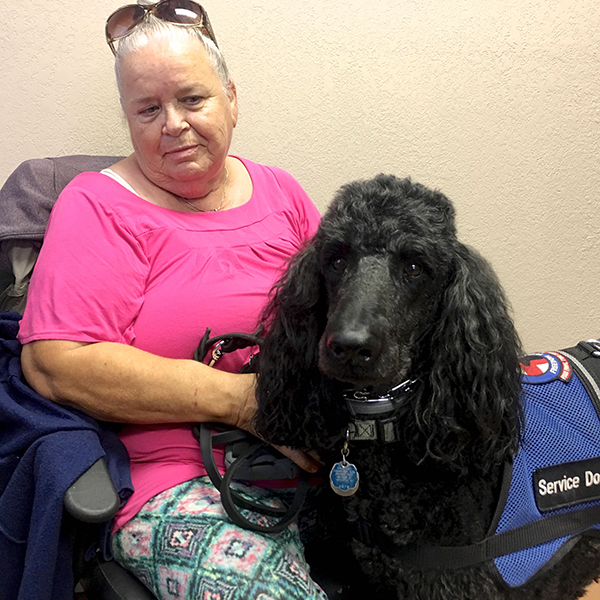
During basic, was your unit all women?
Yes. It was a women’s platoon.
Aside from not being trained on weapons, was there anything else that was different about being a woman in the Army?
During the Vietnam era, women weren’t really looked at as equals. When you joined the military you were either thought of as a floozy or something else.
Did you feel camaraderie with the women in your platoon?
Most definitely. We had each other’s backs no matter what. We all stuck together.
What followed after basic training?
My Advanced Individual Training (AIT) at Ft. Sam Houston in Texas. I trained to be a medic because I wanted to go into the medical corps. It was six weeks of very intensive training but it was well worth it. When I finished, my sergeant asked me to re-up because they wanted to send me on to be a nurse. I was 19 years old and I wasn’t ready to give three more years of my life, so I didn’t do it. As a medic you are trained to do just about everything a RN does because if you’re out in the field, you have to know what you are doing.
At the conclusion of your AIT, where did you start your medical training?
I was stationed at the hospital at Ft. Leonard Wood, Missouri. I was on the surgical floor and a medic in the Army did everything that the RN did except administer drugs. I took care of Vets that came back from Vietnam. I’ll never forget this one young soldier with shrapnel wounds all over his body. He was just torn up. I remember having to pack and clean his wounds. That young man made a real impression on me. You know they’d come back without arms or legs. They made quite an impact on my life.
I saw they were in so much pain. Not only physical pain but emotional pain. There wasn’t anything I could do about it. I just had to do my job and stay neutral. They didn’t really want to talk about it too much because they had seen so many horrible things. I felt empathy for them.
Did you complete your service at that facility?
Yes, but not for the full two years. I only served nine months and 18 days and I was not pregnant. I had an emotional collapse or what they used to call a mental breakdown. I was sexually assaulted. I lost it. I tried to commit suicide. I remember the psychiatrist asking me why I did it. I just told him, “I don’t know.” Because they didn’t believe you if you said things like that. That was a completely different time. For a woman it was, “She asked for it. She did something to make it happen.” There were no repercussions at all for these guys who did this.
Do you think that the military breaks you down, tries to have you fit into a different kind of personality?
I think so, yes. They do kind of break you down but it’s so you become one unit with others around you. You have a code of conduct. You follow that code of conduct with each other. It’s all part of the training, part of the process. Military life is like having a domineering mother times ten.
Do you feel that part of the process caused you to feel you should not speak up about what had happened?
You’re trained to go through a chain of command starting with your immediate officer right above you. If that was a man, in my case it was, I did not feel comfortable going to him and saying anything about what had happened to me. I did not feel I would be believed. I felt like if they did believe me they would blame me because I blamed myself. It was during a time when you just didn’t make waves. You just gritted your teeth, took it and kept going. That’s what I did. I couldn’t work. Any man that came up to me I’d just hide in a corner. I kept it a secret for over 30 years before finally, in counseling, I revealed what happened. I realized I had to let that secret go. My husband knew because I told him, but nobody else knew.
Did you receive an honorable discharge?
Yes, honorable, under medical conditions.
How did you move forward?
While I was still in the military, I married my first husband, Brad, a Vietnam veteran. He was still stationed in Missouri so I went to Wisconsin to live with his mother and stepfather until he was discharged. I found out he was fooling around on me and I went to Missouri to confront him about it. We had a fight and he beat me senseless. I was hospitalized and my father-in-law came out from Wisconsin to get me and bring me home. My father-in-law told him, “If you ever touch her again I will knock you out.”
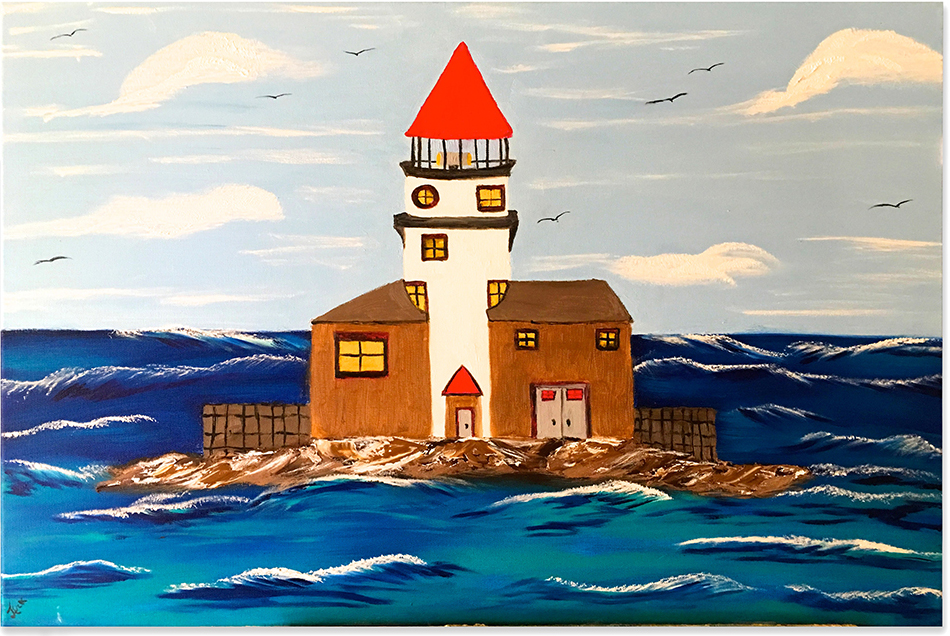
Your father-in-law was supportive of you?
Yes. They saw the aftermath. We eventually got back together after he got out of the military but it took quite a while for me to be able to see him because I was too frightened of him.
How long were you in that marriage?
I was married to him for 14 years. He was an alcoholic and a drug user, very abusive. He’d been to Vietnam a couple of times. I had two children with him. My first son Bradley was born in 1970 in Wisconsin and my second son was born in 1975, also in Wisconsin. We lived there until about 1978. Our youngest son had medical issues and they told us to get him to a drier climate so we moved to Turlock, California.
His drinking and his drug use kept getting worse. One day when the blinds had fallen down, he decided to spank Bradley and started to beat him. That was it. I had let him beat me but when he hit one of the boys, I said, “I’m done. I’m outta here.” Having grown up in a home where my father was an alcoholic and he beat my mother and my brother, I swore no man would ever beat my children. I packed up the boys and left. I divorced him. We went to stay with my mom who lived in Turlock.
How did you feel about leaving?
I tried to leave him before but I always went back. I always thought, “Maybe if he just quits drinking or quits using everything it would be okay” because he was wonderful when he wasn’t on something. He was like Dr. Jekyll/Mr. Hyde.
What did you do next?
I worked at a chicken ranch where I met my present husband, Daniel. He was one of the workers. I was the egg gatherer. He’d always have to come in and help me because I could never quite get it fast enough. We became friends. Once I said, “That’s it. I’m done with Brad, I can’t have this anymore.” He said, “They have an apartment in Denair where I live that you could rent,” and I rented it.
After you left your husband did he try to contact you?
Brad came by the chicken ranch, he’d been drinking. He said, “Well, how about if I move in with you for right now until I can get my own place?” I said, “No, that’s not going to happen.” He grabbed my arm and started to twist it. He was going to hurt me. Daniel stepped in, told him, “You better let her go. Back off!” He did. He took off. I filed charges. He spent overnight in jail. After that, I only saw him twice. He saw the boys two times after the divorce. Then he just quit seeing them. He wouldn’t come around. He was into drugs really bad. My son Bradley had just turned 18 when his biological father died. It was from an overdose and cirrhosis of the liver.
After that, I always felt very protected with Dan. We start dating and eventually married. We’ve been married for 36 years.
Did your sons have recollections of how they had been treated?
Not really. They knew it was a bad situation. I always told my sons, “Don’t stop loving your father. He’s always going to be your father no matter what. Just because we didn’t make it doesn’t mean that you can’t have a relationship with him.” But Brad chose never to come around. When he was trying to get his VA benefits, they asked him where his children lived. He said, “Oh, I think she took them back to Wisconsin.” We lived less than a mile away from him. He lived over in the airport district in an abandoned house. I was shocked when the sheriff came to the door told me Brad had died. I thought they were talking about my child.
I said, “My son Bradley?” They said, “No. Your ex-husband.” His family wanted my son Bradley, at 18 years old, to arrange for the funeral. What experience does an 18 year old have? So, I took care of it.
Tell me about Daniel.
Daniel is a very quiet man. He was born with a hearing deficiency. As he’s gotten older it’s gotten worse. He has five brothers and one sister. His parents are passed away now. Daniel’s a very gentle person but if you upset him, get out of his way. But he’s not abusive. He does not drink and he doesn’t smoke. He got me to go back into being a Christian.
Did you grow up as a Christian?
Yes. We’d go to church hit and miss, except with my grandmother. She was a Methodist. When we were with her we went to church every Sunday, no ifs, ands or buts.
When you say Daniel helped get you back to being a Christian, what did that mean?
I had stopped going to church and reading the Bible. His father was a pastor and his mother was a very gentle sweet soul. When I started dating Daniel, he was going to a Baptist church with his family, so I started going. I fell in love with God again. I knew God loved me even though I’d wandered away for quite a while. I rededicated my life.
During those 30 years of finding God again and being a Christian, did that help with all that you had repressed?
Yes it did because I was afraid to tell people. I don’t really talk about myself very much. I keep everything inside. I’ve always been that way. I’ve had three nervous breakdowns in my life because of it. God helped me find peace when I finally said it out loud to a counselor. I was just terrified to tell anybody.
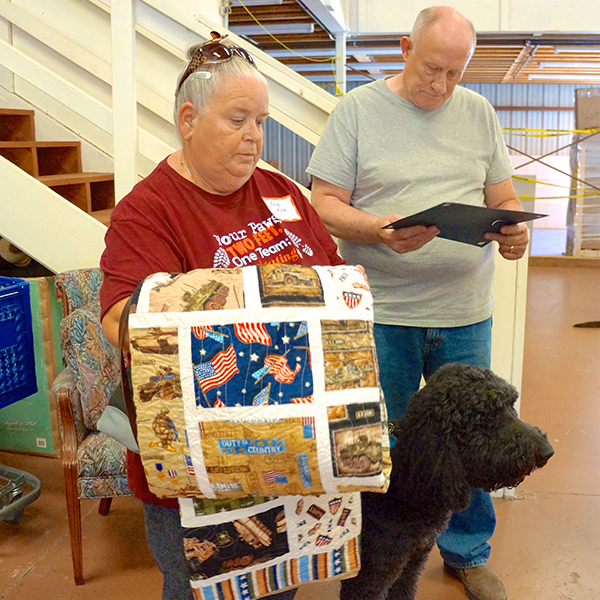
For fear that . . .
I’d be rejected and blamed. I blamed myself. When I finally came out with it and finally told my mother, she told family members that it didn’t happen. It just reaffirmed everything from my childhood.
What led to your decision to talk about the assault after thirty years?
I had two more emotional collapses. I have a major depressive disorder where I go into a very super dark, dark depression. I shut off emotionally. It’s like a light switch just shuts everything off. I couldn’t cope with things. I couldn’t stop crying. I knew my medicine had quit working. I took Prozac, which numbs you. When it quits working, you’re not numb anymore. In 2001, I started going to the VA in Modesto for counseling because I finally decided I needed to tell somebody what had happened. My counselor knew something was going on. It took probably a year of getting to know her when I decided to open up. She finally asked me point blank. It took me about two hours to finally say it.
She asked if you had been sexually assaulted?
Yes. I told her about what happened to me when I was young. I loved my mother dearly when I was growing up, but she was not there for me emotionally. That’s the way she was raised and that’s the way she raised us. Anything I told my mother, she told me it was a lie. She also said I would never amount to anything. I truly believed her. My counselor gave me the sense I could trust her that I could talk about anything. She was very patient and she asked, “Anything else?” I finally said it out loud for the first time in 30 years about the sexual assault in the military.
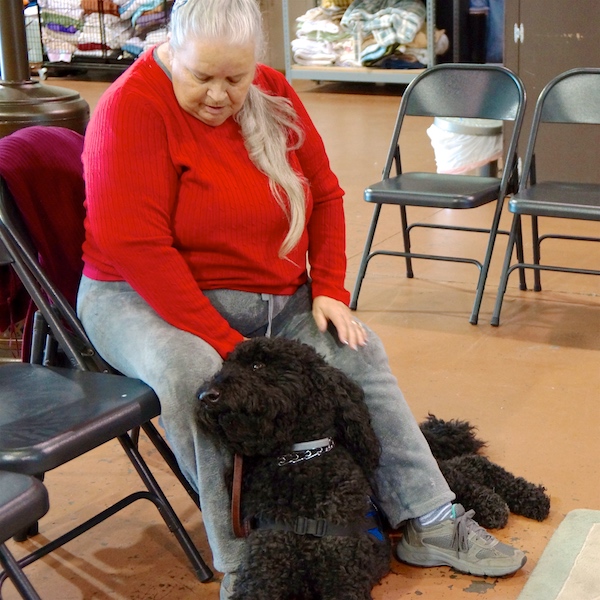
Do you remember what that felt like?
Fear. I was shaking. I was crying because I had bottled it up for so long. I thought I was going to have another emotional break because it was so powerful to hold that secret for so long. You don’t realize how much power it takes away from you when you hold it in. You feel helpless. You feel hopeless. You feel un-believed. Saying it out loud wasn’t so bad. Beginning to talk about it felt okay. Each time I say it now it doesn’t sting anymore. It doesn’t hurt. I can say it out loud. I know it wasn’t my fault. I didn’t ask for it. He was the perpetrator. I was in counseling one-on-one and group therapy for ten years.
Would you say the post-traumatic stress goes back to early years or do you relate it to your experience in the service?
I tie it more to the service because I think that made such a big impact on my life. That was when I had my first emotional break. That, to me, was the most humiliating thing that had ever happened to me. My grandfather never raped me. He molested me. The military was completely different.
How does post-traumatic stress affect you?
I become withdrawn. I’m very hyper-vigilant. I had such a hard time even going to the store before I got [my serviced dog] Mal because people don’t respect your space. I would wait until it was late and then I’d go. I have a hard time trusting people. It takes me a while to get there but once I trust them, I trust. I had a hard time going to appointments in the Bay Area because I had anxiety traveling. My husband drove but I would practically go into a panic mode. Now Mal keeps me calm. I don’t sleep well when my PTSD is acting up.
Do you have nightmares?
Yes, I get insomnia and then I get night terrors.
When did you first learn about service dogs?
I had seen a few veterans around town that told me that they had service dogs. I got interested in it and I started looking it up online. I had wanted a service dog for quite a while because I wanted to feel safe when I went out. The Vet Center in Modesto had flyers for Operation Freedom Paws (OFP). I asked my psychiatrist and he said, “Sure,” and he wrote me a letter. I submitted it. Eventually, OFP called me for an interview and I met with Mary Cortani (Founder/Director of OFP). I’ve been in the program since September 2016.
What was it like meeting Mal?
At first they brought out a little lab puppy. He was real hyper. I thought, “Oh my God, this dog’s going to run me over.” Then Mary said, “Bring in Mal.” When he came in it was like, “Oh, a standard poodle.” I never even thought of a poodle. He’s as big as I am. I stayed for class that night and started coming back to classes and working with him. I was finally able to take him home about a month later. I thought, “Wow, I’m really doing this.” We’ve been training and we are now a [OFP] certified team but I love going back for the camaraderie with the other Vets. I have a sense of belonging somewhere.
Tell me about life with Mal.
Life with Mal is wonderful. He is a gentle giant. He’s so in tune with me. He doesn’t only help with the post-traumatic stress disorder (PTSD). I have diabetes and he alerts me if my blood sugar is off. He also helps me with balance issues that I have sometimes. When I get real tired or stressed my head will shake back and forth. My balance is off when that happens. He will come over and I’ll say, “Brace.” If I’m in my chair, he’ll brace so I can stand up. He’s a real good height for that. He’s a lap dog too. He loves lying in my lap. I have a recliner and he’s up there most of the time. He has my heart. He’s just the love of my life. I don’t think I’ve ever been this close to an animal as I am with him.
How does he alert you about the diabetes?
He’ll sniff behind my ear. If my sugar is up or down, he’ll lick behind my ear. He only licks if my sugar is up or down. It’s mainly up though. Once he licks my ear he’ll sit in front of me. He’s usually right. It will be 1-40 or 1-60. Then I know it’s time to take my medicine.
Did you know at first that that’s why he was licking your ear?
No. I had no idea. Mary said they sense the chemical change. We don’t sense it much of the time. We’re thinking, “What are they doing?” Mary had me do a handkerchief swipe and then have him smell it when my sugar was off. He picked up on it right away. He senses the chemical change and then he’ll start sniffing. He’s insistent on sniffing behind my ear, so then I’ll know. The first couple of times, I ignored it. Then I remembered what Mary said, “Don’t ignore what he’s doing. He’s trying to tell you something.” I thought, “I’d better check.” That’s when I found it was at 1-60. It’s like, “Okay Mal, I gotcha.” Now I don’t question him. If he sniffs or licks I know what he’s telling me.
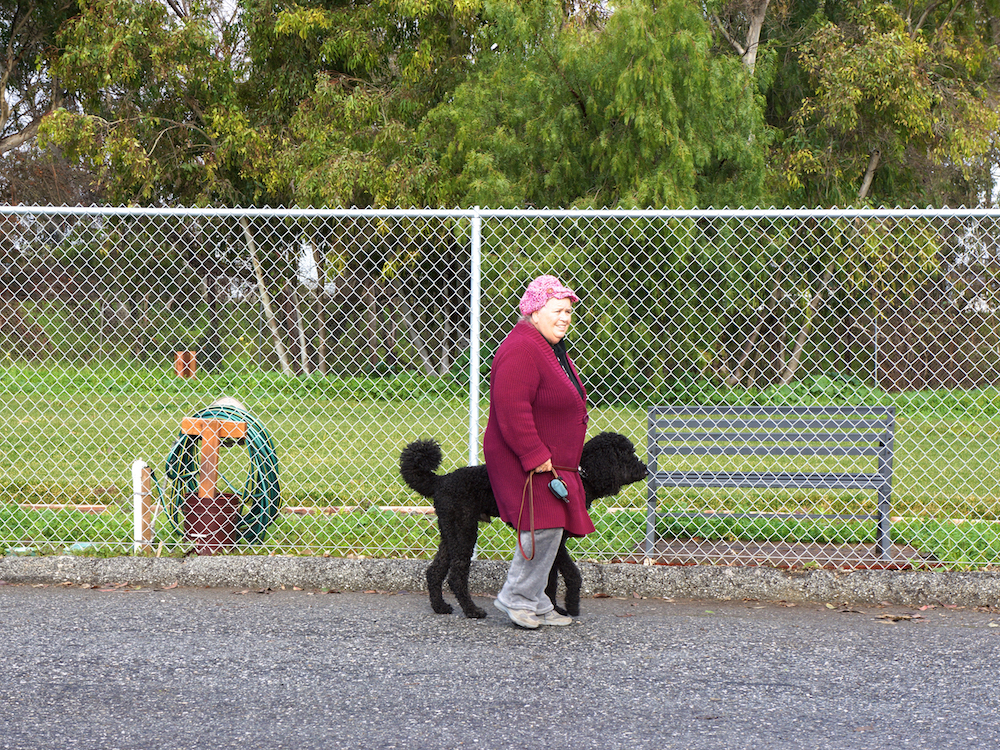
Where does Mal sleep?
He sleeps beside my bed. When my husband gets up to go to the bathroom, he’ll get on the bed and lay next to me. He doesn’t normally do that but for every once in a while. I’m asleep and I don’t know he’s there. Dan tells me about it. “He took my side of the bed!”
If there is an onset of a night terror, does Mal recognize that?
Yes. I usually sleep with my hand out and he will place his muzzle right in my hand. He’ll nudge me until I wake up. He’s very gentle about it. He doesn’t try to startle me.
Was he trained to do that?
I think it’s an instinct with him like with the diabetes.
Does that prevent the dream from happening?
It prevents the dream from going on, like if I’m starting to dream. My husband says I often cry in my sleep. Mal will wake me up so I don’t have the dream. It stops.
Since you’ve had Mal, are you doing more things? Has your life changed?
Most importantly, he helps me out in public. I feel a lot more comfortable going to the store during the day because I have him. I can’t stand to have somebody at my back. He’s the barrier between me and people in my personal space. In the grocery stores nowadays, people love to get right up on your grill. He prevents that from happening. He will automatically go to my back when I’m in a checkout line and sit at my back. If somebody starts to walk up he’ll stand in front of them so they can’t get into my personal space. Also, I would never travel. I was afraid to get in the car. Even making this trip. I would be so anxious and panic stricken. My husband almost wanted to put blinders on me because I’d be so jumpy. If Mal senses that I’m getting uptight, he’ll come and put his head on my shoulder to calm me down. I’ve noticed I haven’t been as uptight going places because he’s right there. He does a lot for me. He’s everything to me.
When you go out in public where do you go?
I will go to Wal-Mart now and to the grocery store. Now I go out during the day. I haven’t attempted the Mall, but I’m going to. I like some of those stores. I’d like to just poke around. We’re going to plan a vacation, which we have never done. We’re probably going to drive to Missouri next year and see my youngest son and his family.
That’s fabulous. A road trip.
Eventually we’d like to take a cruise. Those are things I would’ve never ever thought of doing before.
How do Mal and Daniel get along?
Mal loves Daniel. He really does. He will go and sit in his lap as well as mine. He loves everybody in the house. He’s always with me no matter where I go. If I go out in the back yard, that’s where he is. He looks around to make sure the neighbors aren’t coming through the gate or the fence. If I go to the bathroom, that’s where he is. He’s a very loving dog. He’s always working. Even with his vest off he’s working. He’s my boy.
Do you have other animals?
Yes. I have a 13-year-old Border collie and Australian shepherd mix and three cats. That was a trip bringing him home with the cats. I was so excited to take Mal home and, of course, I had to keep him on the leash for the bonding period. I didn’t know if he’d go after the cats. He did and so I called OFP. They said to get a crate and put him in it one time and then put the cats in the crate one time. Do that back and forth. Then he’ll get used to the cats and he’ll leave them alone. And he did. Before that, I would take his leash, tie it to another leash and tie it to the bedpost so he couldn’t get away and bother the cats when I was sleeping. It only took him about a week before he was acclimated.
Now they’re his cats. He knows his cats. That was a learning experience. He finally got it. He’s off-leash in the house but he’s right by my side wherever I am.
What is he like when the vest comes off?
He is so playful. He just wants to run. He has so much energy so then I take him out and we play ball. That’s his reward for doing good. When I’m painting, he’s right there.
When did you start painting?
I started painting in 2001 just before I had another emotional break. I call my paintings “painting for serenity.” I started with acrylics but moved on to oils. I love oils because they’re an easy medium to work with. They don’t dry super fast but I can make a lot of textures.
I started giving my pictures to veterans so they would have a quiet peaceful place to imagine themselves when they got stressed. The first oil painting I ever made was a mountain because I could always see myself on top of a mountain and looking up to God. I gave that painting to my counselor, she loved it. She put it up in her office, people would ask her about it. I make them for any Vet that asks for one. I don’t charge anything for it. I’m not doing it to make money. It’s a God given gift. I always say, “It’s my God gift.” He gives each one of us a gift and he gave me the gift of painting. I never studied.
What does painting give you?
It gives me peace. It gives me a sense of something bigger than what I am. It gives me a sense of sitting in the lap of Jesus. I can escape in that world. I see that painting in my head and that’s what I put on the canvas. It is very healing and gives me joy to do it for other people.
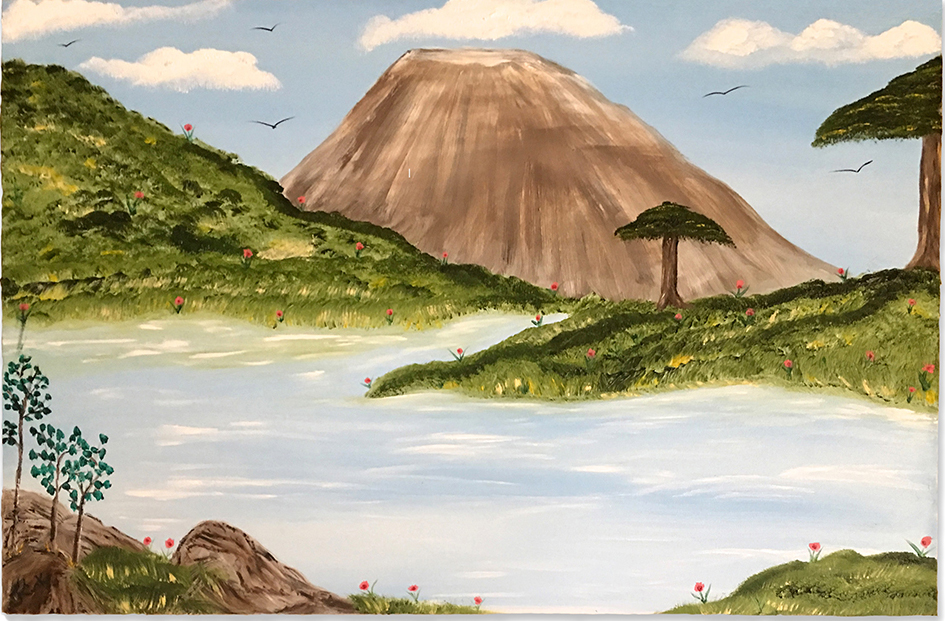
Your life has pivoted in a wonderful way. You’ve accomplished a lot in a pretty short period of time.
Yes, thank you. You can’t live for yesterdays. You’ve gotta live for right this moment. I know I get my strength from God.
Given your own experience and what it took for you to speak about the assault, what would you say to other women in the military that have been subjected to similar incidents?
Number one, I would tell them – believe in yourself; know you’re not at fault. You didn’t ask for it. Number two, tell somebody that you trust, a chaplain or a counselor, what happened to you. Do not keep it bottled up inside. Don’t blame yourself. If you keep it quiet then it eats at you and you continue to blame yourself. Today, I know I’m not at fault for what happened to me. It took me many years to learn that because I’d kept it a secret for so long. Talk about it. Please, please don’t keep it to yourself.
Trust you didn’t ask for it. Know that those who do things like this are predators. They don’t have any place in the military because they’re not going with the flow of camaraderie. They’re in the military to do what they want to do. There should be zero tolerance. I know they’ve tried to make laws, but the military is its own entity. You don’t have to put up with it, you don’t
What would you say to a woman who is thinking of going into the military?
The one thing I would tell her is to be confident in herself. Know she does not have to put up with harassment. Even though it’s military, there is a code of conduct. If people step out of line, it’s okay to stand up for yourself.
Even though it feels risky.
Yes, even though it feels risky. And it still does feel that way for these women even today. That’s the sad part. It hasn’t really changed significantly enough since I was in the military. It’s still happening and it should not be happening. The military should be the place where you have camaraderie and nobody takes advantage of you, nobody takes liberties. It should be a safe place for everybody, men and women.
Other than training Mal, what does Operation Freedom Paws mean to you?
To me this is my family. This is a safe place to be. I feel very safe and very welcomed. I feel loved and cared about. Even though we have graduated, I won’t stop coming because this is my family. That says a lot. It takes a lot to get into my family because of the trust issues I have.
#
RESOURCES | INFORMATION:
- ADA Requirements: Service Animals
- ADA Frequently Asked Questions
- Service dog and training provided by
Operation Freedom Paws - Photographs by Vicki Topaz
